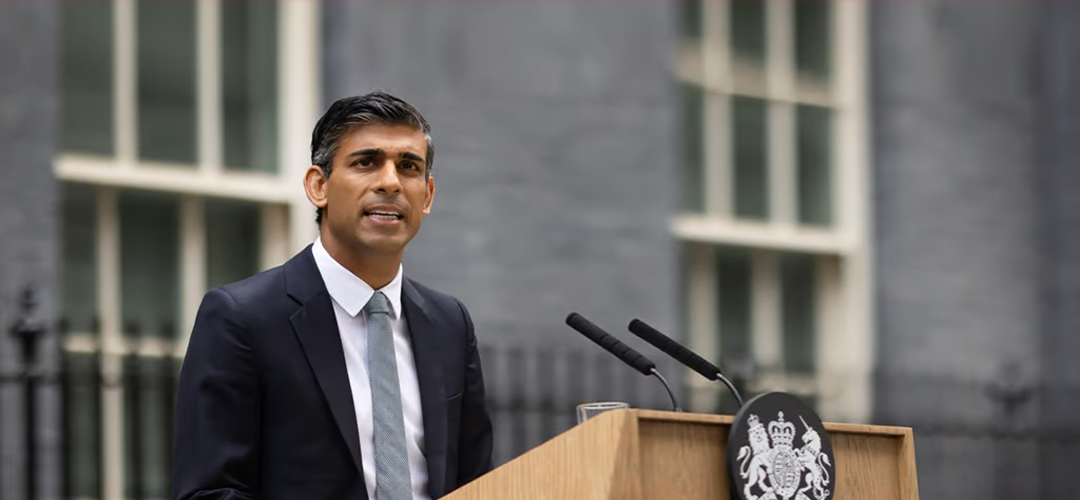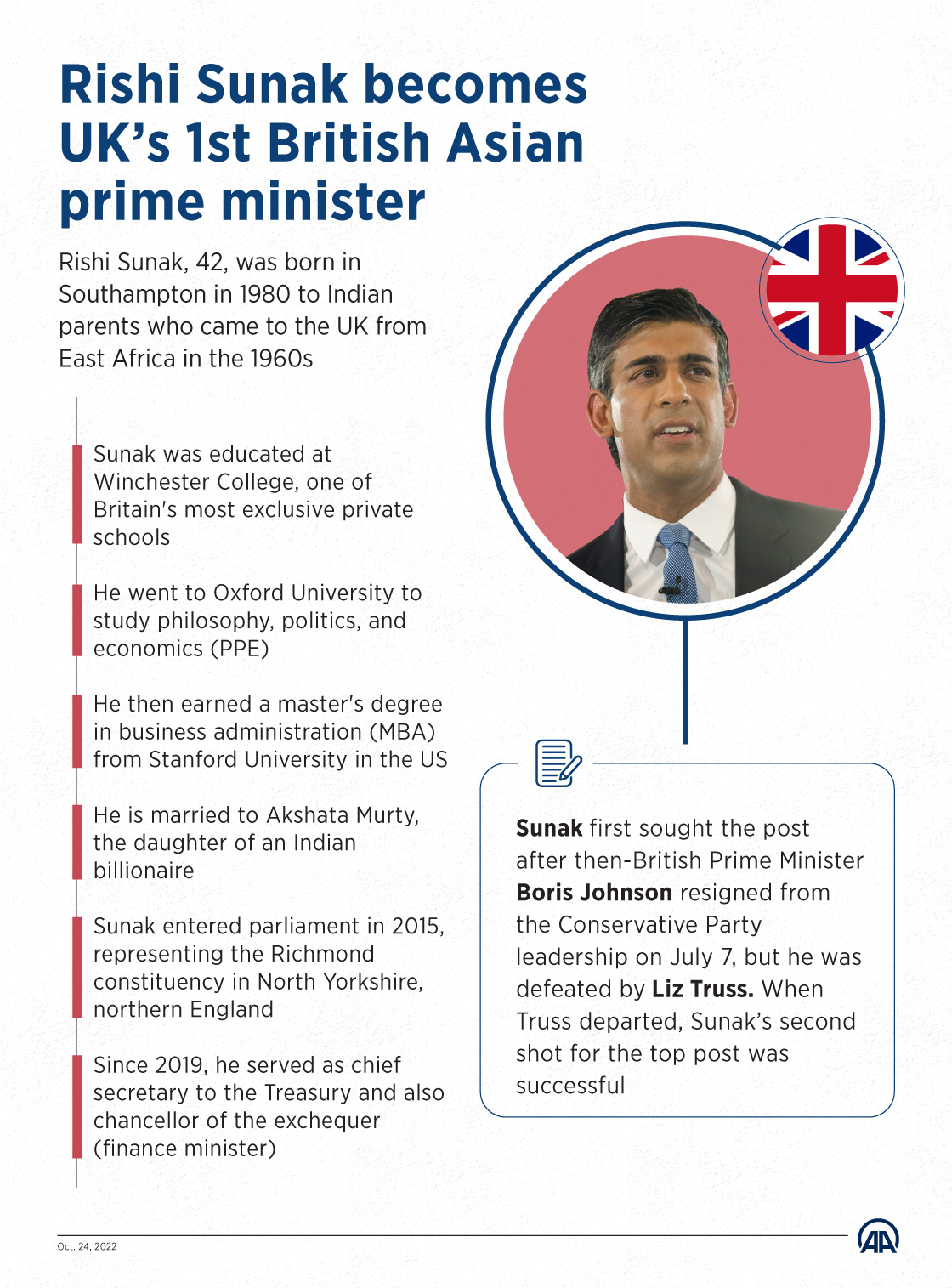THE THIRD TIME'S A CHARM
October 29, 2022 | Expert Insights

Mr Rishi Sunak has become the 57th Prime Minister of the UK and the first Asian to occupy this exalted position. With markets emphatically recording their lack of confidence in Ms Truss, the Tory party has safeguarded the country's running in these tumultuous times into what can only be hoped as a pair of 'safe hands.' A generation X, Mr Sunak, at 42, is the youngest prime minister of the UK in two centuries, and he will surely need all his youthful energy and optimism to put the economy back on rails.
The challenges are far too many to be listed; suffice to say that the economy has taken centre stage with a recession looming large over rising energy and food prices. Within his party, it is a divided house, which does not make his job any easier.
Background
Sunak has experienced nothing less than a phenomenal climb in British politics. Five years after he entered Parliament in 2015 following a career in investment banking, Boris Johnson selected him as the Chancellor of the Exchequer.
After the 2015 general election, Sunak replaced William Hague as the lawmaker for Richmond in North Yorkshire in the House of Commons. Sunak voted in the 2016 referendum to leave the EU. Theresa May's second administration appointed him as Parliamentary Under-Secretary of State for Local Government in the 2018 cabinet shuffle. He voted thrice in support of May's Brexit withdrawal agreement. Following May's resignation, Sunak supported Boris Johnson's ambition to lead the Conservative Party. Sunak was chosen to be the Treasury Department's chief secretary after Johnson was made prime minister. After Sajid Javid resigned in the cabinet shuffle in February 2020, Sunak became the Chancellor of the Exchequer. As Chancellor, Sunak played a substantial role in the financial reaction of the government to the COVID-19 epidemic and its effects on the economy, including the Coronavirus Job Retention and Eat Out to Help Out programmes. Amid a political crisis, he resigned in July 2022 from his position as Chancellor, thus, in a way triggering the avalanche of resignations that led to the exit of Mr Johnson.

Analysis
“There is no doubt we face a profound economic challenge. We now need stability and unity, and I will prioritise bringing our party and our country together.” This was the statement Mr Rishi Sunak, the Prime Minister, made in his first public speech after winning the contest.
Mr Sunak is an astute politician who some would call has the misfortune of being part of a 'stupid party.' The Tory members picked Truss as the PM more on her projected 'loyalty' card than on merit, and unsurprisingly, the gamble did not pay off in these disrupted times where time is money. His dramatic return to the high table obviously carries a grudging acceptance within the party that perhaps ‘he is the best bet’ under the circumstances. Mr Sunak needs all the good luck and support to prove him worthy of this trust as the road to recovery is rocky, and many would gleefully cheer from the sidelines if he fails.
Advices are flying in thick and fast- to focus on reducing the national debt over the rising cost of living and lengthening NHS waits, higher mortgage borrowing rates etc. But Mr Sunak must make his strategy which would mean gathering the best brains in the country around him, quickly hammering together his recovery plan and then driving it through rather than reassuring the public with an eye on the next parliamentary elections.
No doubt, the UK faces a grim future ahead. Tough fiscal decisions will make for higher inflation, and the recession will be more severe without fiscal expansion and the energy price guarantee. Interest rates will probably increase. According to Morgan Stanley analysts, mortgage borrowing prices might reach 6 per cent, which, combined with rising utility costs, could make it difficult for up to 40 per cent of households to make their mortgage payments. Mr Sunak should be prepared to face a barrage of criticism and expect no bouquets.
Much makes Mr Sunak the best proposition to pull the UK out of its current predicament. His experience as a hedge fund manager makes him well acquainted with the market and its behaviour. We will see if his emergency actions can pull up the depressed markets within a few weeks.
The Labour Party will be closely watching his performance, and despite Mr Sunak's call for national unity, very little is likely to be proffered in that direction. Labour, whose stocks are running high nowadays due to the acts of omission of the Tories, know that if Mr Sunak succeeds, their chances of returning to power diminish with every passing day of the recovery period.
However, the bad news for a fiscal conservative like Mr Sunak is that very few voters have economically rightward values. The majority would prefer equality over growth. Now it is up to Mr Sunak to decide where to make the first move because, without commitment and policies to support it, his premiership could be terminated as quickly as his predecessors!
Assessment
- The markets gave their verdict on Mr Rishi's selection by its positive movement. But the prospects of the sinking Pound remain grim as many consider it overpriced.
- Mr Sunak is obviously banking upon the tighter central bank and government policies to swiftly drive down inflation without hurting the economy too much. However, if the economic fallout is more damaging than expected, then inflation rates will remain higher for a longer period preventing a fast recovery.
- Therefore it may be too early to give the 'thumbs up' to Mr Sunak as yet, as he has a tough and long road ahead for which he needs all the support of his nation and lots of good luck!








Comments